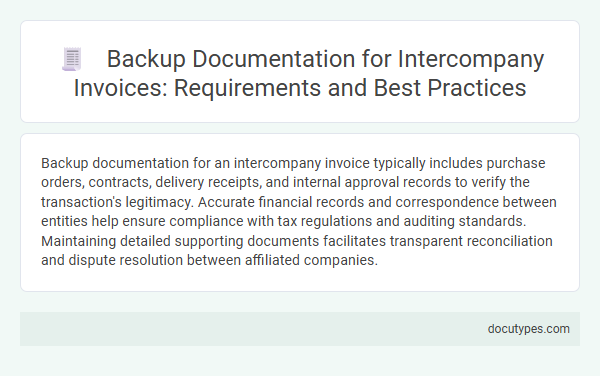Backup documentation for an intercompany invoice typically includes purchase orders, contracts, delivery receipts, and internal approval records to verify the transaction's legitimacy. Accurate financial records and correspondence between entities help ensure compliance with tax regulations and auditing standards. Maintaining detailed supporting documents facilitates transparent reconciliation and dispute resolution between affiliated companies.
Introduction to Backup Documentation for Intercompany Invoices
Backup documentation for intercompany invoices is essential to ensure accuracy and compliance in financial transactions between affiliated entities. It includes purchase orders, delivery receipts, and approval records that verify the legitimacy of the charges. You must maintain these documents to support audit trails and resolve any discrepancies effectively.
Legal and Regulatory Requirements
What backup documentation is required for an intercompany invoice to meet legal and regulatory standards? Companies must retain contracts, purchase orders, and proof of delivery to ensure compliance with tax laws and audit requirements. Proper documentation supports transaction legitimacy and mitigates risks of penalties or disputes during regulatory reviews.
Key Components of Backup Documentation
Backup documentation for an intercompany invoice includes essential records that validate the transaction between related entities. Key components consist of signed agreements, purchase orders, and detailed delivery receipts that confirm the goods or services exchanged.
Supporting financial documents such as payment records, tax compliance certificates, and correspondence between departments ensure accuracy and regulatory adherence. These elements collectively provide a clear audit trail to justify the intercompany charges and facilitate internal controls.
Common Types of Supporting Documents
Backup documentation for an intercompany invoice ensures transparency and compliance during audits. Common supporting documents validate the accuracy and legitimacy of transactions between affiliated entities.
Purchase orders confirm the agreed terms and quantities of goods or services exchanged. Delivery receipts or shipping documents provide proof of goods dispatched or services rendered.
Tax Compliance and Audit Readiness
Backup documentation for an intercompany invoice must include detailed contracts, purchase orders, and proof of delivery to ensure tax compliance. These documents validate the transaction and support the accurate calculation of tax liabilities.
Maintaining copies of correspondence and payment records strengthens audit readiness by providing a clear transaction trail. Tax authorities require these records to verify that transfer pricing and VAT or sales tax are correctly applied. Proper documentation reduces the risk of penalties and facilitates smoother audits.
Best Practices for Document Retention
Backup documentation for intercompany invoices is essential to ensure compliance and resolve disputes efficiently. Proper document retention supports audit readiness and strengthens internal controls.
- Invoice Copies - Retain original and processed copies of intercompany invoices to verify transaction details and amounts.
- Approval Records - Maintain documented evidence of managerial or department approvals to validate transaction legitimacy.
- Supporting Contracts - Store contracts or agreements related to intercompany transactions to demonstrate the basis and terms of invoicing.
Digital vs. Physical Recordkeeping
Backup documentation for an intercompany invoice is essential to ensure compliance and accurate financial reporting. Understanding the differences between digital and physical recordkeeping helps you maintain proper audit trails and supports verification processes.
- Digital backup documentation - Includes scanned copies of contracts, emails, and electronic invoices stored in secure cloud systems for easy access and retrieval.
- Physical backup documentation - Consists of printed contracts, signed agreements, and invoice copies maintained in organized filing systems to comply with regulatory requirements.
- Retention policies for records - Govern how long both digital and physical documents must be kept to meet legal and tax obligations related to intercompany transactions.
Maintaining both forms of backup documentation ensures completeness and readiness for internal reviews or external audits.
Internal Controls and Approval Processes
| Backup Documentation | Purpose | Key Internal Controls | Approval Processes |
|---|---|---|---|
| Intercompany Agreement | Validates the basis and terms of charges between entities | Ensures clear contractual obligations and pricing guidelines | Reviewed and approved by legal and finance departments |
| Detailed Invoice Copy | Provides itemized charges, dates, and transaction specifics | Supports accuracy and completeness of billed amounts | Verification by accounts payable and reconciliation with accounting records |
| Approval Documentation | Evidence of authorization from responsible managers or controllers | Prevents unauthorized transactions and enforces segregation of duties | Sign-offs recorded electronically or via paper trails |
| Supporting Transaction Records | Includes purchase orders, delivery notes, or service reports | Confirms the legitimacy and fulfillment of billed goods or services | Cross-checked during invoice processing and internal audits |
| Reconciliation Reports | Matches intercompany balances to detect discrepancies | Maintains data integrity and avoids duplicate or missing entries | Reviewed periodically by finance controllers and internal audit teams |
Maintaining proper backup documentation for your intercompany invoices reinforces strong internal controls and streamlines approval processes, minimizing risks of errors and ensuring regulatory compliance.
Challenges and Solutions in Backup Documentation
Backing up intercompany invoices requires precise documentation such as purchase orders, delivery receipts, and internal approval records to ensure transparency and audit compliance. Challenges arise from discrepancies in data synchronization, varying accounting standards, and the complexity of cross-border transactions. You can overcome these issues by implementing standardized processes, using integrated financial software, and maintaining clear communication between departments.
What Backup Documentation Is Needed for an Intercompany Invoice? Infographic

